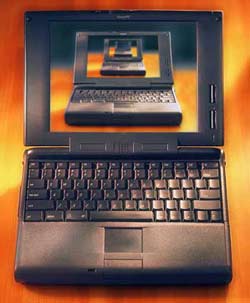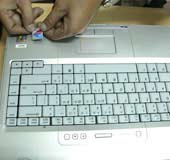A colleague of mine shared that he recently purchased a Centrino laptop with a processing speed of 1.5 GHz for $950. When he proudly showcased this high-end gadget to many people, what surprised him the most was the overwhelming mix of compliments and criticisms he received.
Some people thought it was too expensive, while others considered it quite cheap. Some believed that a laptop battery lasting about 2 hours was adequate, but there were also opinions stating that with Centrino models, the battery should last over 3 hours. I decided to delve into the laptop market and uncover many mysteries.
“Cooking” the Hardware  My neighbor, who works as a technician for a computer sales company in Ton That Tung, District 1, Ho Chi Minh City, confirmed that the laptop business today is highly profitable. Selling a computer priced at $1,200 to $1,300 typically yields about $500 to $600 in profit. Seeing my surprise, he explained in detail: Each new laptop imported by Vietnamese companies usually comes with two batteries and two chargers. However, most customers only receive one battery and one charger upon purchase. The current market price for a new laptop battery is $80, while a charger costs around $70. Just like that, many stores are making an extra $150.
My neighbor, who works as a technician for a computer sales company in Ton That Tung, District 1, Ho Chi Minh City, confirmed that the laptop business today is highly profitable. Selling a computer priced at $1,200 to $1,300 typically yields about $500 to $600 in profit. Seeing my surprise, he explained in detail: Each new laptop imported by Vietnamese companies usually comes with two batteries and two chargers. However, most customers only receive one battery and one charger upon purchase. The current market price for a new laptop battery is $80, while a charger costs around $70. Just like that, many stores are making an extra $150.
Even with such profits, some stores further “cook” the hardware specifications of the laptops. For instance, a laptop with an 80 GB hard drive might be swapped for a 40 GB drive; a 40 GB drive could be replaced with a 20 GB one. Similarly, a 512 MB RAM might be downgraded to 256 MB… Currently, the price for an 80 GB hard drive is over $120, and a 40 GB drive is about $75. The selling price for 512 MB RAM is around $85, while 256 MB RAM is just $45. With this method, many stores have managed to earn an additional $100 per machine. According to some computer sales employees, the rate of machines with “cooked” hard drives and RAM is no less than 30%.
“The Wizard” of Laptop Batteries
In laptops, batteries are a crucial component that customers pay close attention to due to their high cost and frequent malfunctions. Therefore, many stores only offer a 6-month warranty on batteries and screens, while other components are covered for up to one year.
A technician specialized in warranties revealed that batteries are an area shrouded in mystery. Stores currently depend on a person named T., who runs two shops in Ho Chi Minh City. T. is dubbed the “Wizard of Laptop Batteries.” For example, the warranty period for a battery is 6 months, but if a customer experiences issues after 5 months and 25 days, the battery might fail. If the problem cannot be resolved, the store must replace the defective battery for the customer. T. specializes in these cases. Just bring the battery and mention how much warranty time is left, and T. can make the battery “come back to life” past its warranty period before it ultimately fails, allowing the store to fulfill its warranty obligation. The cost for such a restoration is only about 100,000 VND. If the restoration takes more than a month, it can go up to around 350,000 VND.
Reviving batteries is the goal that technicians and electronics workers at Japan Taro Market in Ho Chi Minh City always aim for. However, to this day, no one has been able to replace T. Specialists in this field know that laptop batteries contain 8 battery cells similar to AA batteries, but slightly larger. This type of battery is also sold at Japan Taro Market. However, the crucial issue is that laptop battery casings have chips, circuit boards, and firmware. How to ensure that when replacing the small battery cells, the firmware of the battery casing accepts them is something that no one has managed to accomplish, and that is T.’s secret.
Currently, not only does this “wizard” revive batteries, but he also manufactures batteries for sale at half the price of imported ones. T. claims that the batteries he produces can power a DVD for 1.5 movies, equivalent to about 4 hours!
How to Check Your Laptop?  How can you tell if the laptop you purchased has been “cooked”? According to experts in this field, typically if it’s a new, brand-name laptop, it should always come with licensed software. Therefore, if a new machine from major manufacturers lacks legitimate software, it is highly likely that the hard drive has been “cooked.” The price for a set of legitimate software can exceed a hundred dollars. Specifically for IBM laptops, there is a hardware check feature that can be activated by pressing Thinkpad + F11, prompting the computer to self-check. If there are any unfamiliar hardware components, the machine will report an error. For branded products, all hardware in the machine should have matching serial numbers. Any hardware with a different serial number is considered cooked.
How can you tell if the laptop you purchased has been “cooked”? According to experts in this field, typically if it’s a new, brand-name laptop, it should always come with licensed software. Therefore, if a new machine from major manufacturers lacks legitimate software, it is highly likely that the hard drive has been “cooked.” The price for a set of legitimate software can exceed a hundred dollars. Specifically for IBM laptops, there is a hardware check feature that can be activated by pressing Thinkpad + F11, prompting the computer to self-check. If there are any unfamiliar hardware components, the machine will report an error. For branded products, all hardware in the machine should have matching serial numbers. Any hardware with a different serial number is considered cooked.
However, recently, many laptop stores have countered this verification method by affixing their warranty seals on the screws of the laptop casing. If customers remove the screws to check the internal serial numbers of the components, the warranty seal gets torn, allowing the store to deny warranty responsibility on that basis.


















































